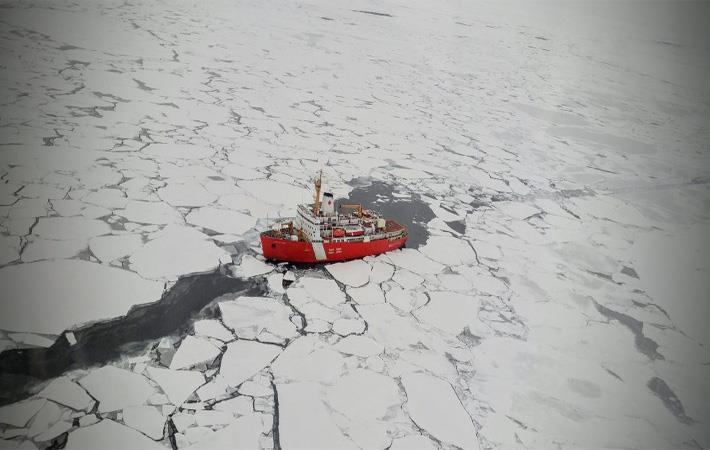Interviews
Textile fibres polluting Arctic Ocean: Ocean Wise
27 Jan '21
3 min read

Pic: Ocean Wise Aquablog
Fibres from clothing and textiles may be a major source of microplastic pollution in the Arctic Ocean, according to a study by Ocean Wise. Synthetic fibres made up approximately 92 per cent of microplastic pollution in seawater samples from across the Arctic Ocean. About 73 per cent of those were polyester and resembled fibres used in clothing and textiles.
These findings are detailed in a scientific paper, published in the international scientific journal Nature Communications. The study represents the most comprehensive research of Arctic microplastics ever undertaken. Led by Ocean Wise, the research was enabled through strong collaborative support from Fisheries and Oceans Canada.
Ocean Wise analysed samples from 71 locations across the European and North American Arctic, including the North Pole. Samples were collected by One Ocean Expeditions RV Akademik Ioffe and by Fisheries and Oceans Canada Arctic programmes aboard the Canadian icebreakers CCGS Louis S. St-Laurent and CCGS Sir Wilfrid Laurier. These vessels travelled more than 19,000 kilometres across the Arctic Ocean during their 2016 expeditions.
Synthetic fibres make up approximately 92 per cent of microplastic pollution found in near-surface seawater samples from across the Arctic Ocean. And about 73 per cent of those fibres are polyester and resemble fibres used in clothing and textiles.
“The Arctic Ocean, while distant to many of us, has long provided` food and a way of life for Inuit communities,” said Dr. Peter Ross, lead author of the study, special advisor to Ocean Wise and adjunct professor at Earth, Atmospheric and Ocean Sciences at the University of British Columbia. “The study again underscores the vulnerability of the Arctic to environmental change and to pollutants transported from the south. It also provides important baseline data that will guide policy makers in mitigation of microplastic pollution in the world’s oceans, with synthetic fibres emerging as a priority.”
Ocean Wise also analysed water samples up to a depth of 1,015 metres at six sites in the Beaufort Sea. From their analysis, the scientists calculated the average concentration of microplastics to be around 40 microplastic particles per cubic metre. They also observed almost three times more microplastic particles in the eastern Arctic compared to the western Arctic, suggesting that new polyester fibres are being delivered to the eastern Arctic Ocean by currents from the Atlantic. In other words, an important source of microfibres in the Arctic is likely the countries surrounding the Atlantic Ocean.
The research highlights the role that textiles, laundry and wastewater discharge has in the contamination of the world’s oceans. It builds on Ocean Wise’s previous research showing the large numbers of synthetic microfibres in municipal wastewater and the prevalence of plastic microfibres in Arctic Beluga whale intestines.
“Ocean Wise continues to be at the forefront of solution-oriented ocean microplastic research in partnership with the apparel and retail sectors, government agencies, and the Arctic Inuit and Inuvialuit communities,” said Dr. Anna Posacka, co-author of the study and research manager of the Ocean Wise Plastics Lab, the facility that carried out microplastic analysis. “Reducing fibre releases from textiles represents a significant opportunity to curb marine microfibre pollution. And together with Ocean Wise’s Microfibre Partnership, some forward-looking companies and initiatives are looking for ways to address this problem.”
This study builds on a current partnership between Ocean Wise, Fisheries and Oceans Canada, Environment and Climate Change Canada, and the University of British Columbia to examine the effects of various textile microfibres on organisms at the base of a coastal food web.
These findings are detailed in a scientific paper, published in the international scientific journal Nature Communications. The study represents the most comprehensive research of Arctic microplastics ever undertaken. Led by Ocean Wise, the research was enabled through strong collaborative support from Fisheries and Oceans Canada.
Ocean Wise analysed samples from 71 locations across the European and North American Arctic, including the North Pole. Samples were collected by One Ocean Expeditions RV Akademik Ioffe and by Fisheries and Oceans Canada Arctic programmes aboard the Canadian icebreakers CCGS Louis S. St-Laurent and CCGS Sir Wilfrid Laurier. These vessels travelled more than 19,000 kilometres across the Arctic Ocean during their 2016 expeditions.
Synthetic fibres make up approximately 92 per cent of microplastic pollution found in near-surface seawater samples from across the Arctic Ocean. And about 73 per cent of those fibres are polyester and resemble fibres used in clothing and textiles.
“The Arctic Ocean, while distant to many of us, has long provided` food and a way of life for Inuit communities,” said Dr. Peter Ross, lead author of the study, special advisor to Ocean Wise and adjunct professor at Earth, Atmospheric and Ocean Sciences at the University of British Columbia. “The study again underscores the vulnerability of the Arctic to environmental change and to pollutants transported from the south. It also provides important baseline data that will guide policy makers in mitigation of microplastic pollution in the world’s oceans, with synthetic fibres emerging as a priority.”
Ocean Wise also analysed water samples up to a depth of 1,015 metres at six sites in the Beaufort Sea. From their analysis, the scientists calculated the average concentration of microplastics to be around 40 microplastic particles per cubic metre. They also observed almost three times more microplastic particles in the eastern Arctic compared to the western Arctic, suggesting that new polyester fibres are being delivered to the eastern Arctic Ocean by currents from the Atlantic. In other words, an important source of microfibres in the Arctic is likely the countries surrounding the Atlantic Ocean.
The research highlights the role that textiles, laundry and wastewater discharge has in the contamination of the world’s oceans. It builds on Ocean Wise’s previous research showing the large numbers of synthetic microfibres in municipal wastewater and the prevalence of plastic microfibres in Arctic Beluga whale intestines.
“Ocean Wise continues to be at the forefront of solution-oriented ocean microplastic research in partnership with the apparel and retail sectors, government agencies, and the Arctic Inuit and Inuvialuit communities,” said Dr. Anna Posacka, co-author of the study and research manager of the Ocean Wise Plastics Lab, the facility that carried out microplastic analysis. “Reducing fibre releases from textiles represents a significant opportunity to curb marine microfibre pollution. And together with Ocean Wise’s Microfibre Partnership, some forward-looking companies and initiatives are looking for ways to address this problem.”
This study builds on a current partnership between Ocean Wise, Fisheries and Oceans Canada, Environment and Climate Change Canada, and the University of British Columbia to examine the effects of various textile microfibres on organisms at the base of a coastal food web.
Fibre2Fashion News Desk (SV)
Popular News
Leave your Comments
Editor’s Pick
Yohan Lawrence
Joint Apparel Association Forum (JAAFSL)
Salvatore Piccione
Label - Salvatore Piccione
Alex and Zofia Torun-Shaw
Brand - Laird Utility
































-Ltd..jpg?tr=w-120,h-60,c-at_max,cm-pad_resize,bg-ffffff)





.jpg?tr=w-120,h-60,c-at_max,cm-pad_resize,bg-ffffff)
.jpg?tr=w-120,h-60,c-at_max,cm-pad_resize,bg-ffffff)






